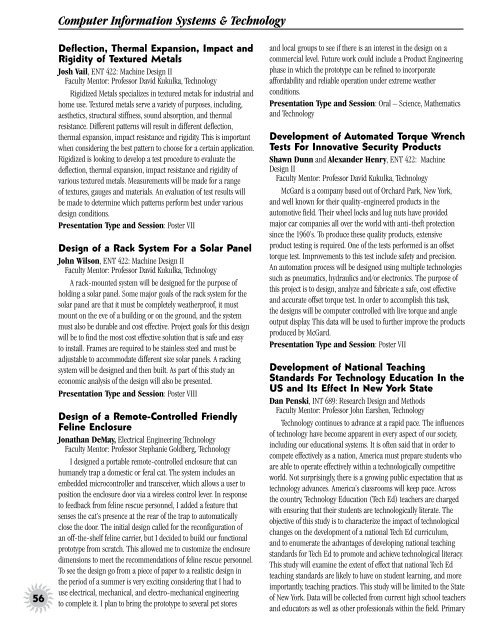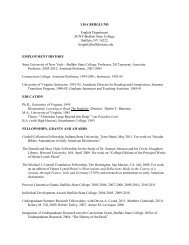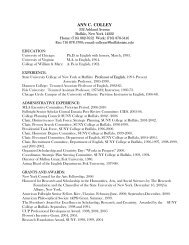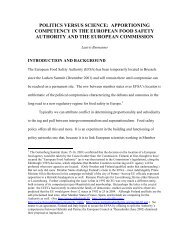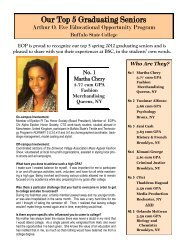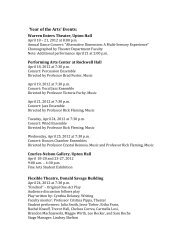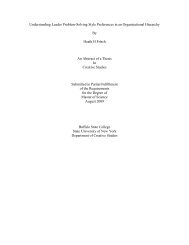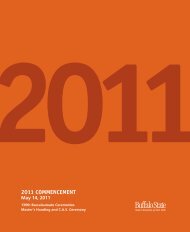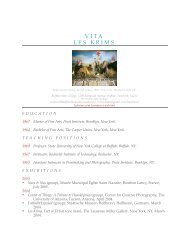Arts - Buffalo State College
Arts - Buffalo State College
Arts - Buffalo State College
You also want an ePaper? Increase the reach of your titles
YUMPU automatically turns print PDFs into web optimized ePapers that Google loves.
56<br />
Computer Information Systems & Technology<br />
Deflection, Thermal Expansion, Impact and<br />
Rigidity of Textured Metals<br />
Josh Vail, ENT 422: Machine Design II<br />
Faculty Mentor: Professor David Kukulka, Technology<br />
Rigidized Metals specializes in textured metals for industrial and<br />
home use. Textured metals serve a variety of purposes, including,<br />
aesthetics, structural stiffness, sound absorption, and thermal<br />
resistance. Different patterns will result in different deflection,<br />
thermal expansion, impact resistance and rigidity. This is important<br />
when considering the best pattern to choose for a certain application.<br />
Rigidized is looking to develop a test procedure to evaluate the<br />
deflection, thermal expansion, impact resistance and rigidity of<br />
various textured metals. Measurements will be made for a range<br />
of textures, gauges and materials. An evaluation of test results will<br />
be made to determine which patterns perform best under various<br />
design conditions.<br />
Presentation Type and Session: Poster VII<br />
Design of a Rack System For a Solar Panel<br />
John Wilson, ENT 422: Machine Design II<br />
Faculty Mentor: Professor David Kukulka, Technology<br />
A rack-mounted system will be designed for the purpose of<br />
holding a solar panel. Some major goals of the rack system for the<br />
solar panel are that it must be completely weatherproof, it must<br />
mount on the eve of a building or on the ground, and the system<br />
must also be durable and cost effective. Project goals for this design<br />
will be to find the most cost effective solution that is safe and easy<br />
to install. Frames are required to be stainless steel and must be<br />
adjustable to accommodate different size solar panels. A racking<br />
system will be designed and then built. As part of this study an<br />
economic analysis of the design will also be presented.<br />
Presentation Type and Session: Poster VIII<br />
Design of a Remote-Controlled Friendly<br />
Feline Enclosure<br />
Jonathan DeMay, Electrical Engineering Technology<br />
Faculty Mentor: Professor Stephanie Goldberg, Technology<br />
I designed a portable remote-controlled enclosure that can<br />
humanely trap a domestic or feral cat. The system includes an<br />
embedded microcontroller and transceiver, which allows a user to<br />
position the enclosure door via a wireless control lever. In response<br />
to feedback from feline rescue personnel, I added a feature that<br />
senses the cat’s presence at the rear of the trap to automatically<br />
close the door. The initial design called for the reconfiguration of<br />
an off-the-shelf feline carrier, but I decided to build our functional<br />
prototype from scratch. This allowed me to customize the enclosure<br />
dimensions to meet the recommendations of feline rescue personnel.<br />
To see the design go from a piece of paper to a realistic design in<br />
the period of a summer is very exciting considering that I had to<br />
use electrical, mechanical, and electro-mechanical engineering<br />
to complete it. I plan to bring the prototype to several pet stores<br />
and local groups to see if there is an interest in the design on a<br />
commercial level. Future work could include a Product Engineering<br />
phase in which the prototype can be refined to incorporate<br />
affordability and reliable operation under extreme weather<br />
conditions.<br />
Presentation Type and Session: Oral – Science, Mathematics<br />
and Technology<br />
Development of Automated Torque Wrench<br />
Tests For Innovative Security Products<br />
Shawn Dunn and Alexander Henry, ENT 422: Machine<br />
Design II<br />
Faculty Mentor: Professor David Kukulka, Technology<br />
McGard is a company based out of Orchard Park, New York,<br />
and well known for their quality-engineered products in the<br />
automotive field. Their wheel locks and lug nuts have provided<br />
major car companies all over the world with anti-theft protection<br />
since the 1960’s. To produce these quality products, extensive<br />
product testing is required. One of the tests performed is an offset<br />
torque test. Improvements to this test include safety and precision.<br />
An automation process will be designed using multiple technologies<br />
such as pneumatics, hydraulics and/or electronics. The purpose of<br />
this project is to design, analyze and fabricate a safe, cost effective<br />
and accurate offset torque test. In order to accomplish this task,<br />
the designs will be computer controlled with live torque and angle<br />
output display. This data will be used to further improve the products<br />
produced by McGard.<br />
Presentation Type and Session: Poster VII<br />
Development of National Teaching<br />
Standards For Technology Education In the<br />
US and Its Effect In New York <strong>State</strong><br />
Dan Penski, INT 689: Research Design and Methods<br />
Faculty Mentor: Professor John Earshen, Technology<br />
Technology continues to advance at a rapid pace. The influences<br />
of technology have become apparent in every aspect of our society,<br />
including our educational systems. It is often said that in order to<br />
compete effectively as a nation, America must prepare students who<br />
are able to operate effectively within a technologically competitive<br />
world. Not surprisingly, there is a growing public expectation that as<br />
technology advances. America’s classrooms will keep pace. Across<br />
the country, Technology Education (Tech Ed) teachers are charged<br />
with ensuring that their students are technologically literate. The<br />
objective of this study is to characterize the impact of technological<br />
changes on the development of a national Tech Ed curriculum,<br />
and to enumerate the advantages of developing national teaching<br />
standards for Tech Ed to promote and achieve technological literacy.<br />
This study will examine the extent of effect that national Tech Ed<br />
teaching standards are likely to have on student learning, and more<br />
importantly, teaching practices. This study will be limited to the <strong>State</strong><br />
of New York. Data will be collected from current high school teachers<br />
and educators as well as other professionals within the field. Primary


